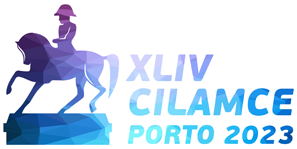Agustín Ferrante Award
The Agustín Ferrante Award is a traditional student competition promoted yearly by ABMEC to motivate young researchers who are participating (with a contributed paper) to the Research Beginners Mini-Symposium. The award is intended to acknowledge undergraduate students who show potential for outstanding scientific achievements. The following rules and instructions apply:
All undergraduate students with an accepted full-paper are eligible for the award. The full-paper must have only two authors: the undergraduate student and his/her supervisor. Graduate students who have obtained their bachelor´s degree after December 2022 may also apply.
An Award Committee designated by CILAMCE’s Organizing Committee will evaluate and rank selected contributions during their oral presentations, considering the following criteria:
- novelty
- clarity in presentation
- scientific relevance
- clarity in the definition of objectives
- literature review
- methodology description
- results pertinence and presentation
- final remarks and conclusions.
The three best ranked contributions will receive the Agustín Ferrante Award during the Congress Banquet.
HOW TO APPLY
To apply to the Agustín Ferrante Award, interested contenders must send an email to the congress secretariat (cilamceporto2023@fe.up.pt) until November 1 (01/11/2023) with the following documents:
- Title and number of the accepted full-length paper
- A recommendation letter (in PDF format) from the student´s supervisor, indicating the student´s year (or semester), his/her course and the type of project to which the research was linked (e.g., Research Project funded by official research agencies, “Iniciação Científica”, etc).
WHO WAS AGUSTÍN FERRANTE
Professor Agustín Juan Ferrante was born in Buenos Aires, Argentina, on October 14th, 1938, son of Italian immigrants living in a working class neighborhood. He excelled early in his studies and went on to obtain an undergraduate degree in Mechanical Engineering from the University of Buenos Aires, where he distinguished himself as a young engineer.
Based on his bright prospects, he obtained a scholarship to pursue a Master degree in civil engineering at the Massachusetts Institute of Technology in 1964, which turned into a doctorate degree as he developed novel research in computational structural methods. The connections he made and the experience gained during this period significantly shaped the rest of his career, including lifelong friendships with several outstanding engineers and a commitment to learning and teaching state-of-the-art structural analysis.
On return to Argentina, he accepted a position as a professor in the Computational Center of the Department of Engineering at the University of Buenos Aires. From there, he began a long career as a leading academic professor in Brazil, where he was instrumental in developing and managing high-caliber graduate programs. Furthermore, he established strong links between academia and industry, as he pursued the strengthening of applied research programs.
In particular, his involvement with the Graduate Engineering Project Coordination (COPPE) center (via the Federal University of Rio de Janeiro, UFRJ) and the Brazilian multinational energy company PETROBRAS resulted in significant contributions in the area of advanced structural analysis in offshore engineering applications throughout the end of the 1970s and the 1980s.
Professor Ferrante idealized and organized the first CILAMCE as well as other CILAMCE editions in the following years. After this period, Prof. Ferrante moved to Italy, where he translated his recognized analytical expertise into a consulting appointment as the director and senior engineer of ISC International, STRUDL Europe Srl, and STRUDL (UK) Limited. In this capacity, he successfully performed a wide range of structural analyses in various applications throughout the world. In his long career, Prof. Ferrante always maintained an unwavering dedication to the field of structural engineering, to the fostering of his multiple professional relationships, and the developmental support of engineers (particularly, the younger generation).
Professor Ferrante passed away unexpectedly at his home in Vedano al Lambro, Italy, on June 13th, 2009 leaving an immense void in his family, friends and colleagues
This text was adapted from the obituary published by the Wessex Institute (https://www.wessex.ac.uk/)

